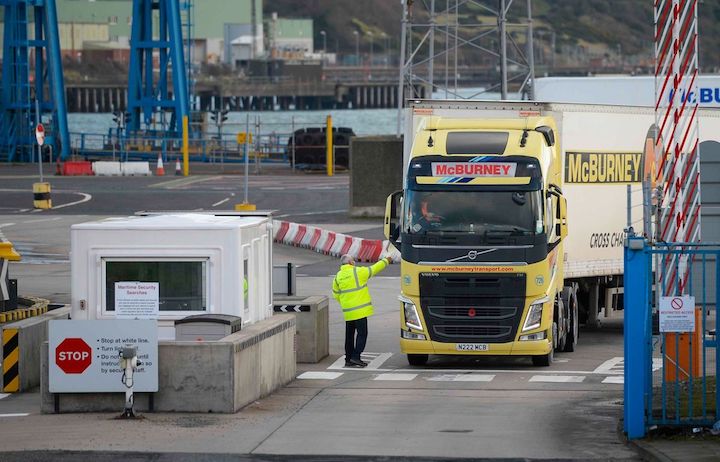U.K.’s Johnson threatens to suspend Northern Ireland Brexit deal
Boris Johnson threatened to suspend parts of the Brexit deal relating to Northern Ireland as a dispute escalated after the European Union’s threat to impose controls on the border in a spat over vaccine supply.
Responding in Parliament on Wednesday to claims he had “betrayed” the province by agreeing to checks on goods between Great Britain and Northern Ireland, the prime minister said he would act.

“We will do everything we need to do, whether legislatively, or indeed by invoking Article 16 of the Protocol, to ensure there is no barrier down the Irish Sea,” Johnson told the House of Commons.
Traders have faced disruption moving goods into the province from the rest of the U.K due to new customs checks and paperwork required in the so-called Northern Ireland Protocol agreed as part of the Brexit settlement with the EU just over a month ago. Article 16 is an emergency trigger that allows either side to intervene if the protocol’s application creates “serious economic, societal or environmental difficulties.”
Tensions over Northern Ireland have risen significantly over the past week, especially since the European Commission announced it would activate Article 16 to control exports of vaccines to Northern Ireland—blindsiding the U.K. and Irish governments and infuriating unionist political leaders.
Even though the EU conceded its decision was wrong and retreated within hours, the debacle risks reopening one of the most controversial aspects of the Brexit negotiations.
‘Betrayed’
“I speak for all of my constituents today when I tell you that the Protocol has betrayed us and has made us feel like foreigners in our country,” Democratic Unionist Ian Paisley told Johnson in the House of Commons.
Under the terms of the Brexit deal Johnson signed, Northern Ireland—unlike the rest of the U.K.—remained in the EU’s customs union and single market to avoid both creating a visible border with the Irish Republic and restarting decades of sectarian conflict.
Instead, goods face complex checks as they cross the Irish Sea. But to ease the pain, not all checks were introduced when the U.K.’s post-Brexit transition period ended on Dec. 31. Even so, businesses have complained of delays and disruption as they move goods from one part of the U.K. to another while port staff have faced threats of violence.
In a strongly-worded letter seen by Bloomberg that condemned the EU’s action over vaccines, U.K. Cabinet Office Minister Michael Gove called on European Commission Vice President Maros Sefcovic to extend the grace periods covering trade in some goods until 2023. The two men are due to meet on Wednesday afternoon, along with the first minister and deputy first minister of Northern Ireland.
‘Grave Error’
In the letter, Gove described the Commission’s decision as a “grave error,” adding that “the feelings of disappointment were particularly acute given the concerns that had already arisen about the practical operation of the Protocol and its economic and societal effects.”
Updating the U.K. Parliament on Tuesday, Gove was blunt about the damage he thought the EU had done, saying the European Commission in Brussels had “mucked up.”
“In recent days we’ve seen an increase in community tension,” Gove said. “We will work over coming days to fix the difficulties on the ground.”
Under the terms of the Brexit deal, authorities were granted grace periods on checks on consignments between Great Britain and Northern Ireland relating to supermarkets and their suppliers, chilled meats, medicines and parcel deliveries. Extending them until 2023 would take the arrangements beyond the next election to the Northern Ireland Assembly scheduled to take place by May 2022.
‘Different Space’
Ahead of his appearance in Parliament on Wednesday, Johnson held talks on with Northern Ireland First Minister Arlene Foster. Paisley said the meeting was positive.
“The prime minister is in a very different space,” Paisley said. “He was blindsided,” he added. “He’s now moved on away from that dreadful language we saw that it was just ‘teething troubles’.”
Officials from both the EU and the U.K. have temporarily halted some checks at the region’s ports after what Mid & East Antrim Council called “an upsurge in sinister and menacing behavior.” That included “graffiti within the local area referencing increasing tensions around the Northern Ireland Protocol and describing port staff as targets.”
The EU told staff working in Northern Ireland not to go to work Tuesday, a day after the region stopped physical inspections of products of animal origin at the ports of Belfast and Larne amid security concerns. Document checks will continue, and the measure will be kept under review, Northern Ireland’s agriculture ministry said in a statement.
Similar Stories

December 2024 U.S. Transportation Sector Unemployment (4.3%) Was the Same As the December 2023 Level (4.3%) And Above the Pre-Pandemic December 2019 Level (2.8%)
View ArticleDP World appoints Jason Haith as Vice President of Freight Forwarding for U.S. and Mexico
DP World, a global leader in logistics and supply chain solutions, has announced the appointment of Jason Haith as Vice President, Commercial Freight Forwarding – U.S. and Mexico, effective immediately.…
View Article
Amaero secures final approval for $23.5M loan from Export-Import Bank
View ArticleU.S. Bureau of Labor Statistics employment situation
Total nonfarm payroll employment increased by 256,000 in December, and the unemployment rate changed little at 4.1 percent, the U.S. Bureau of Labor Statistics reported today. Employment trended up in…
View ArticleImport Cargo to remain elevated in January
A potential strike at East Coast and Gulf Coast ports has been avoided with the announcement of a tentative labor agreement, but the nation’s major container ports have already seen…
View ArticleS&P Global: 2025 U.S. transportation infrastructure sector should see generally steady demand and growth
S&P Global Ratings today said it expects activity in the U.S. transportation sector will continue to normalize in 2025, with growth rates for most modes of transportation slowing to levels…
View ArticleGet the most up-to-date trending news!
SubscribeIndustry updates and weekly newsletter direct to your inbox!





